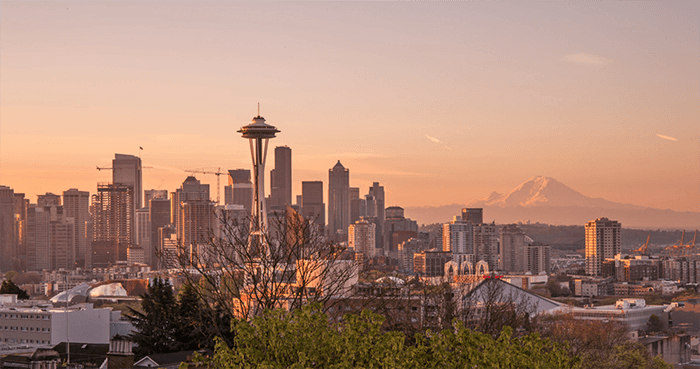Seattle businesses are going to get hit by $200M head tax
SEATTLE, WA — Seattle City Council has passed a progressive payroll tax on the city’s largest businesses with a vote of 7 – 2. That margin makes it veto-proof, an important note considering that Mayor Jenny Durkan has signaled opposition to the tax.
The tax, called JumpStart Seattle, was proposed by councilmember Teresa Mosqueda in mid-June as an alternative to councilmember Kshama Sawant’s Amazon Tax, an earlier proposal that would have raised roughly up to $500 million each year from Seattle’s largest businesses.
JumpStart Seattle will raise an estimated $214 million instead. Though significantly less than the Amazon Tax, it is also a far cry from the 2018 head tax: a similar $47 million tax that, at the time, was met with widespread criticism and repealed less than a month after it had been unanimously approved by the council.
Part of JumpStart’s success can be attributed to a change in the times: both the head tax and JumpStart Seattle provide funding for social programs and affordable housing, addressing problems that were present in 2018 but which have persisted and are now exacerbated by the pandemic.
“We cannot starve our way out of this recession,” said Mosqueda. “Data from the great recession showed is that in the cities and in the states that tried an austerity budget, it did not work. It actually made the economies weaker.”
Another part of its success could be the subtle ways its implementation differs from the head tax. The head tax applied a flat, $275 dollar fee per employee on businesses that earned more than $20 million annually. At the time opponents argued the tax punished bigger businesses from employing in Seattle, and would push them elsewhere.
JumpStart Seattle casts a different net: it applies to corporations whose payrolls reach over $7 million annually. Even then, the tax is only applied to individual payrolls for employees who make more than $150,000 each year.
Depending on how more much those employees make, their employers will be taxed between 0.7 and 2.4 percent of their pay. In the weeks leading up to the vote to approve the tax, supporters argued that the change was significant enough, and the need great enough, that residents would ultimately approve of this new tax.
Some holdouts remained, however. Councilmembers Debora Juarez and Alex Pedersen both voted against the tax, arguing that it could still cause some businesses to relocate. Both also asked instead that voters be given an opportunity to weigh in on the tax in November.
“Seattle has a well established, democratic tradition of giving voters the final say,” said Juarez.
Similar sentiments have been echoed by Durkan’s office as well.
The new tax goes into effect at the beginning of 2021 but will have made an impact before then. Now that JumpStart Seattle has passed, councilmembers will work to set aside $86 million to be given for coronavirus relief for small businesses, immigrants and refugee support programs, housing, and food security. That money will then be replenished by the JumpStart Seattle tax raised next year.
The remaining money the tax raises in 2021 will be split between emergency services, COVID-19 relief programs, and administration costs. After 2021, the money will be used on affordable housing investments, equitable development, and supporting local businesses.
“In the midst of a pandemic housing insecurity isn’t just a moral health crisis, it’s a public health crisis,” said Mosqueda “Expanding services and vouchers will help struggling people put food on the table.”
JumpStart Seattle was passed alongside two amendments added Monday. The first created exemptions for non-profit health care providers and researchers.
The second and much more hotly-debated amendment reintroduced a sunset clause into the legislation. The sunset clause has been a sticking point for some, including many callers who lodged public comment before the vote. The clause means the tax will expire in 20 years, or if another progressive taxing plan is passed at the state or county level.
Mosqueda’s initial JumpStart Seattle pitch included a 10-year sunset, which had been removed after the public and legislators both raised concerns it was too limiting. At Monday’s meeting, councilmember Sawant argued the clause should’ve stayed out of the picture.
“This is extremely problematic and furthermore completely tone-deaf to bring this amendment at the last second when the public cant speaks out against this,” said Sawant. “The public has spoken, the movement has spoken clearly against any kind of sunset clause.”
“I felt like we sort of resolved this issue,” said councilmember Herbold, who also voted against the clause. The sunset clause amendment ended up on the bill by a vote of 5 – 4.
But, despite strong differences of opinion on that sunset clause, all seven supporters of the tax seemed universally optimistic when the final vote to pass the tax came.
“I am, I will admit, very frustrated with the two amendments that just got added to this bill, but I do not want that to take away from the historic nature of what we are about to pass here,” said Morales. “We know that today the city takes a crucial step to embrace equity and reject corporate influence over our tax policies. Today the Seattle City Council is boldly leading to create a more equitable way to finance public services, and we challenge elected officials at the state level to join us in choosing investment over austerity.”
“We must build on our momentum, the movement to tax Amazon and big business to fund housing and essential services is needed everywhere, and we must actively spread it,” said Sawant.
“This is a huge win, thank you so very much for your ongoing feedback,” said Mosqueda. “This is about caring for Seattleites now, and for the future. We together, are making history.”




